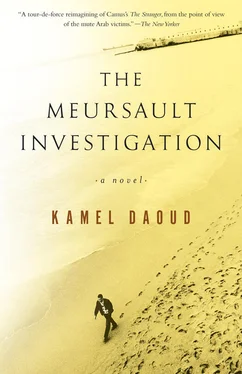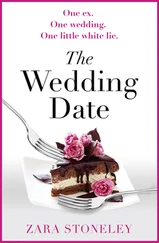Ha, ha! What are you drinking? In these parts, you get offered the best liquors after your death, not before. And that’s religion, my brother. Drink up — in a few years, after the end of the world, the only bar still open will be in Paradise.
I’m going to outline the story before I tell it to you. A man who knows how to write kills an Arab who, on the day he dies, doesn’t even have a name, as if he’d hung it on a nail somewhere before stepping onto the stage. Then the man begins to explain that his act was the fault of a God who doesn’t exist and that he did it because of what he’d just realized in the sun and because the sea salt obliged him to shut his eyes. All of a sudden, the murder is a deed committed with absolute impunity and wasn’t a crime anyway because there’s no law between noon and two o’clock, between him and Zujj, between Meursault and Musa. And for seventy years now, everyone has joined in to disappear the victim’s body quickly and turn the place where the murder was committed into an intangible museum. What does “Meursault” mean? Meurt seul , dies alone? Meurt sot , dies a fool? Never dies? My poor brother had no say in this story. And that’s where you go wrong, you and all your predecessors. The absurd is what my brother and I carry on our backs or in the bowels of our land, not what the other was or did. Please understand me, I’m not speaking in either sorrow or anger. I’m not even going to play the mourner. It’s just that … it’s just what? I don’t know. I think I’d just like justice to be done. That may seem ridiculous at my age … But I swear it’s true. I don’t mean the justice of the courts, I mean the justice that comes when the scales are balanced . And I’ve got another reason besides: I want to pass away without being pursued by a ghost. I think I can guess why people write true stories. Not to make themselves famous but to make themselves more invisible, and all the while clamoring for a piece of the world’s true core.
Drink up and look out the window — you’d think this country was an aquarium. Right, right, but it’s your fault too, my friend; your curiosity provokes me. I’ve been waiting for you for years, and if I can’t write my book, at least I can tell you the story, can’t I? A man who’s drinking is always dreaming about a man who’ll listen. That’s today’s bit of wisdom, write it down in your notebook …
It’s simple: The story we’re talking about should be rewritten, in the same language, but from right to left. That is, starting when the Arab’s body was still alive, going down the narrow streets that led to his demise, giving him a name, right up until the bullet hit him. So one reason for learning this language was to tell this story for my brother, the friend of the sun. Seems unlikely to you? You’re wrong. I had to find the response nobody wanted to give me when I needed it. You drink a language, you speak a language, and one day it owns you; and from then on, it falls into the habit of grasping things in your place, it takes over your mouth like a lover’s voracious kiss. I knew someone who learned to write in French because one day his illiterate father received a telegram no one could decipher. This was in the days when your hero was still alive and the colonists were still running the show. The telegram lay rotting in this fellow’s pocket for a week before somebody read it to him. In three lines, it informed him of his mother’s death, somewhere deep in the treeless country. He told me, “I learned to write for my father, and I learned to write so that such a thing could never happen again. I’ll never forget his anger with himself, and his eyes begging me to help him.” Basically, my reason’s the same as his. Well, go on, read some more, even if the whole thing’s written in my head. Every night, my brother Musa, alias Zujj, arises from the Realm of the Dead and pulls my beard and cries, “Oh my brother Harun, why did you let this happen? I’m not a sacrificial lamb, damn it, I’m your brother!” Go on, read!
Let’s be clear from the start: There were just two siblings, my brother and me. We didn’t have a sister, much less a slutty one, as your hero suggested in his book. Musa was my older brother, his head seemed to strike the clouds. He was quite tall, yes, and his body was thin and knotty from hunger and the strength anger gives. He had an angular face, big hands that protected me, and hard eyes because our ancestors lost their land. But when I think about it, I believe he already loved us then the way the dead do, with a look in his eyes that came from the hereafter and with no useless words. I don’t have many pictures of him in my head, but I want to describe them to you carefully. For example, the day he came home early from the neighborhood market, or maybe from the port, where he worked as a porter and handyman, toting, dragging, lifting, sweating. Anyway, that day he came across me while I was playing with an old tire, and he put me on his shoulders and told me to hold on to his ears, as if his head were a steering wheel. I remember how ecstatic I felt while he rolled the tire along and made a sound like a motor. His smell comes back to me too, a persistent mingling of rotten vegetables, sweat, muscles, and breath. Another picture in my memory is from the day of Eid one year. He’d given me a hiding the day before for some stupid thing I’d done and now we were both embarrassed. It was a day of forgiveness, he was supposed to kiss me, but I didn’t want him to lose face and lower himself by apologizing to me, not even in God’s name. I also remember his gift for immobility, the way he’d stand stock-still on the threshold of our house, facing the neighbors’ wall, holding a cigarette and the cup of black coffee our mother would bring him.
Our father had disappeared ages before, reduced to fragments by the rumors of people who claimed to have run into him in France, and only Musa could hear his voice. He’d give Musa commands in his dreams, and Musa would relay them to us. My brother had seen him again only once since he’d left, and from such a distance that he wasn’t really sure it was him anyway. As a child, I knew how to distinguish the days with rumors from the days without. When my brother Musa would hear people talk about my father, he’d come home, all feverish gestures and burning eyes, and then he and Mama would have long, whispered conversations that always ended in heated arguments. I was excluded from those, but I got the gist: For some obscure reason, my brother held a grudge against Mama, and she defended herself in a way that was even more obscure. Those were unsettling days and nights, filled with anger, and I recall my panic at the idea that Musa might leave us too. But he’d always return at dawn, drunk, oddly proud of his rebellion, seemingly endowed with renewed strength. Then my brother Musa would sober up and fade away. All he wanted to do was sleep, and so my mother would get him under her control again. I’ve got some pictures in my head, they’re all I can offer you. A cup of coffee, some cigarette butts, his espadrilles, Mama crying and then recovering very quickly to smile at a neighbor who’d come to borrow some tea or spices, moving from distress to courtesy so fast it made me doubt her sincerity, young as I was. Everything revolved around Musa, and Musa revolved around our father, whom I never knew and who left me nothing but our family name. Do you know what we were called in those days? Uled el-assas , the sons of the guardian. Of the watchman, to be more precise. My father worked as a night watchman in a factory where they made I don’t know what. One night, he disappeared. And that’s all. That’s the story I got. It happened in the 1930s, right after I was born. That’s why I always imagine him gloomy, wrapped up in a coat or a black djellaba, crouching in some dim corner, and silent, without so much as a single answer for me.
Читать дальше












